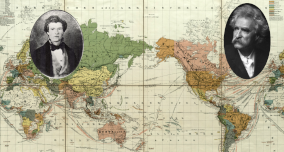May 3 & 4, 1878
We made a short halt at Frankfort-on-the-Main, and found it an interesting city. I would have liked to visit the birthplace of Gutenburg, but it could not be done, as no memorandum of the site of the house has been kept. So we spent an hour in the Goethe mansion instead. The city permits this house to belong to private parties, instead of gracing and dignifying herself with the honor of possessing and protecting it.
Frankfort is one of the sixteen cities which have the distinction of being the place where the following incident occurred. Charlemagne, while chasing the Saxons (as HE said), or being chased by them (as THEY said), arrived at the bank of the river at dawn, in a fog. The enemy were either before him or behind him; but in any case he wanted to get across, very badly. He would have given anything for a guide, but none was to be had. Presently he saw a deer, followed by her young, approach the water. He watched her, judging that she would seek a ford, and he was right. She waded over, and the army followed. So a great Frankish victory or defeat was gained or avoided; and in order to commemorate the episode, Charlemagne commanded a city to be built there, which he named Frankfort—the ford of the Franks. None of the other cities where this event happened were named for it. This is good evidence that Frankfort was the first place it occurred at.
Frankfort has another distinction—it is the birthplace of the German alphabet; or at least of the German word for alphabet —BUCHSTABEN. They say that the first movable types were made on birch sticks—BUCHSTABE—hence the name.
I was taught a lesson in political economy in Frankfort. I had brought from home a box containing a thousand very cheap cigars. By way of experiment, I stepped into a little shop in a queer old back street, took four gaily decorated boxes of wax matches and three cigars, and laid down a silver piece worth 48 cents. The man gave me 43 cents change.
In Frankfort everybody wears clean clothes, and I think we noticed that this strange thing was the case in Hamburg, too, and in the villages along the road. Even in the narrowest and poorest and most ancient quarters of Frankfort neat and clean clothes were the rule. The little children of both sexes were nearly always nice enough to take into a body's lap. And as for the uniforms of the soldiers, they were newness and brightness carried to perfection. One could never detect a smirch or a grain of dust upon them. The street-car conductors and drivers wore pretty uniforms which seemed to be just out of the bandbox, and their manners were as fine as their clothes.
See Bædeker The Rhine from Rotterdam to Constance page 208
